home > insights > WHY WASN’T F.W. BOREHAM MORE WIDELY KNOWN?
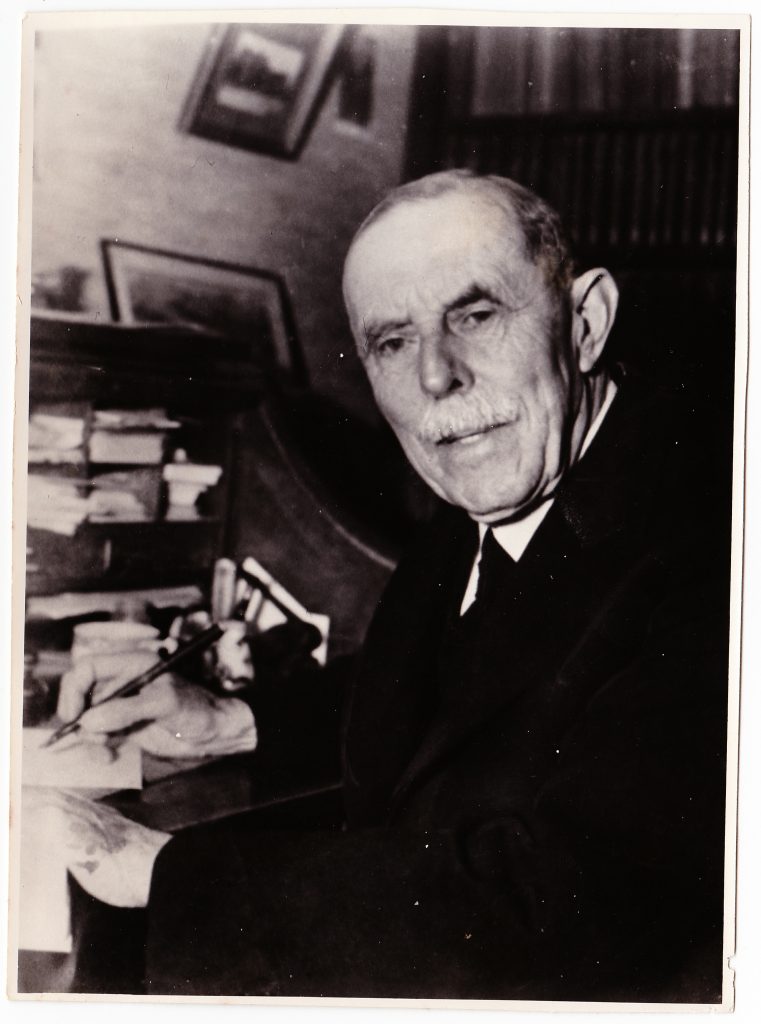
The last known photo of Dr. F.W. Boreham where he is sitting at his roll-top desk which is now on display at Whitley College, Melbourne
HE IS LARGELY UNKNOWN
It might surprise you to learn that F.W. Boreham was quite young when he was born. This isn’t as comical as it sounds when you consider that some people only begin to enjoy a level widespread popularity later in their life. This is also many people’s introduction to F.W. Boreham. A new reader of FWB meets an author who tended to C.H. Spurgeon and D.L. Moody, and was a published author from the 1890s. This immediately gives them the impression they meeting someone who was always old. While there are some photos of the young FWB, they are rare. Of the photos we have of him, the bulk of them are later in his life, which also gives the impression that F.W. Boreham was always old. But there was a time when he was not thought of as old. As I write this, I am in my 50s. While I don’t necessarily regard myself as ‘old’ (despite the opinion of my 4 children), it was when Boreham was in his early fifties that he began to reach worldwide acclaim as a preacher (having already reached worldwide renown as a writer). His tour of the U.K. in 1924 drew thousands to his meetings. It was during this tour that his biographer, Howard Crago points out that many were claiming that Boreham was one of the best preachers in the world. His 1936 tour of the UK and North America, when he was in his sixties, drew even larger crowds and gave him an even greater audience for his books. Yet, despite these crowds and these accolades, and despite book sales in the millions, today, he is largely unknown. I was recently asked by a quizzical New Zealand pastor, Geoff Lloyd, why this was the case. Here’s what I told him.
F.W. BOREHAM’S TEMPERED AMBITION
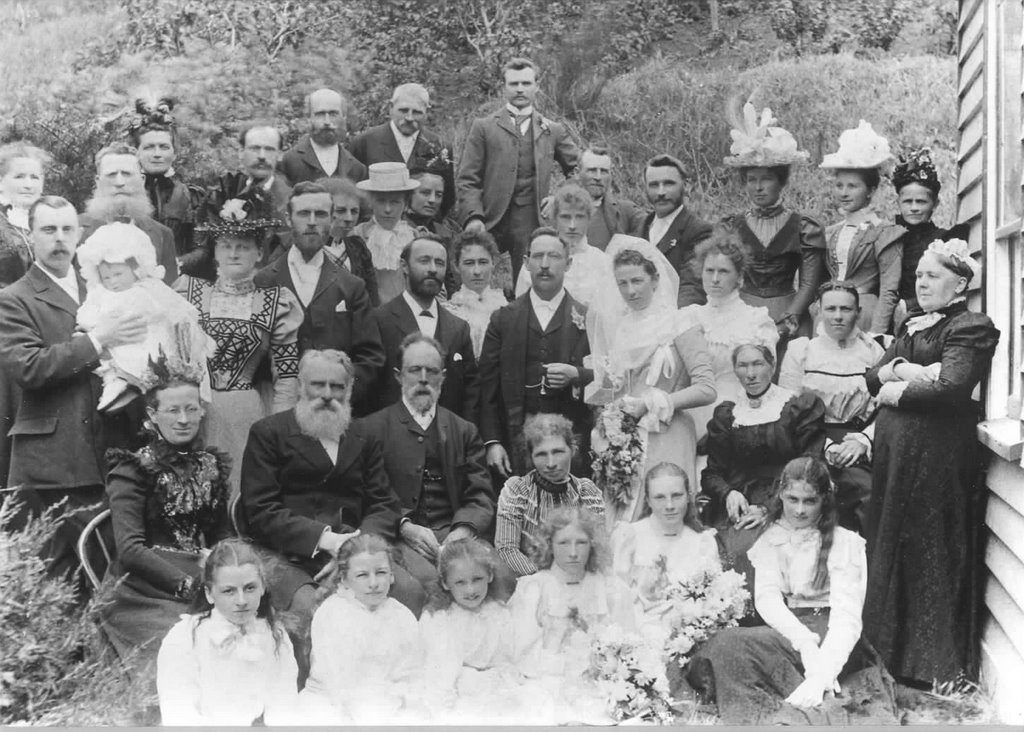
The Mosgiel Baptists, ca. 1897
When F.W. Boreham was farewelled (to New Zealand) in 1895 from Metropolitan Tabernacle as a 24 year old student of Pastors College, he declared that his ambition was to pastor three churches and then be available to the broader body of Christ to minister across various denominations. He essentially fulfilled this aspiration. What is notable about this ambition is what he didn’t aspire to be. He essentially saw pastoring as his calling. This, as modelled by Spurgeon, intimately involved preaching and bringing people to Christ. Thus, for Boreham, the role of a pastor involved the individual conversion of each of his congregation members. In his autobiography he tells of his farewell send-off from Mosgiel after nearly 12 years there as their pastor. When the celebrations were over and everything was packed up in readiness for the sea voyage the next day to Tasmania to take up the pastorate of Hobart, he felt the need to take a stroll in the cool of the night where he came upon a young lady weeping profusely. He tells us that she confided that she felt sad that although she had sat under his ministry for so many years, she had failed to surrender to the Saviour. And now, she felt, with Boreham’s departure, it might be too late. FWB tells how he assured her that it was not too late and that she could at this very moment look to Saviour for the forgiveness of her sins – which she did! Boreham felt that this was the most fitting end to his time of ministry in New Zealand. He tells how this lady remained in the church and was a faithful servant of Christ with her sons grew up to become Baptist missionaries.
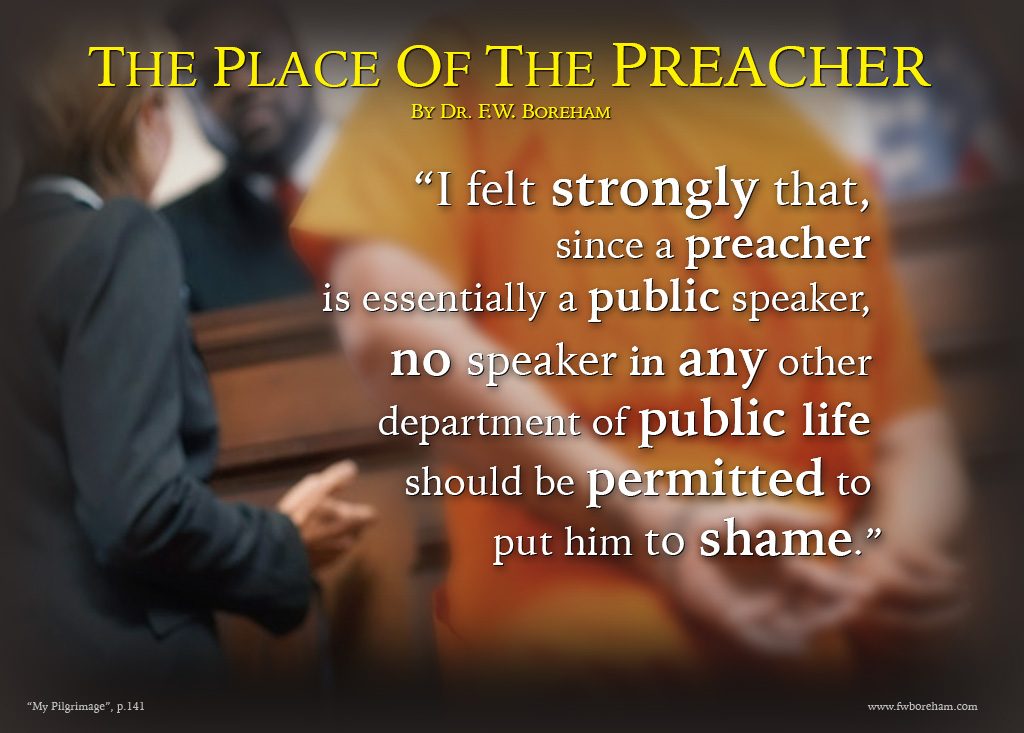
FWB on the place of the preacher
It was during his time in Mosgiel that Frank realised his lack as a preacher. He worked hard to develop his voice, his pitch, and his delivery. He would go down to the Taieri Mouth and practice casting his into the strong winds to someone at the other end of the beach. He would spend afternoons in the Dunedin Law Courts studying the gestures and techniques of the barristers pleading with juries for the lives of their clients. After being scolded by the older Scots in his church for being too dependent on his sermon notes, Boreham began to develop a way of abbreviating his sermon notes (which he later glued to a piece of plywood after a gust of wind blue them off the pulpit he was preaching from) so that his style was more natural.

FWB’s last sermon notes – glued onto a piece of ply. Howard Crago tells us that despite the brevity and stenographic nature of these notes, Boreham would preach his published essays word-for-word!
As Boreham became an outstanding preacher in New Zealand, invitations came from all around the nation to preach. After one triumphant preaching engagement he returned to his home in Mosgiel to find Stella, his wife, despondent. Despite his great joy from the pleasure of being so appreciated by the congregations he preached to, Stella professed that his time away had been her loneliness and most miserable. This early moment in FWB’s ministry had a powerful effect on his priorities (which led him to vow to never put his ministry before his wife or family) and somewhat of a tempering effect upon his ministry ambitions.
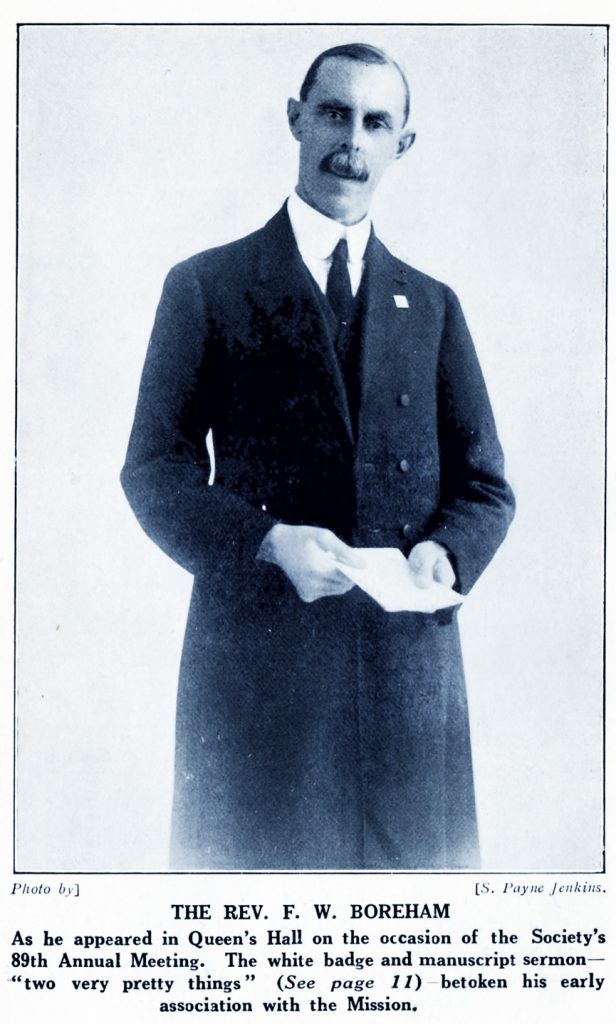
This photo of FWB was commissioned by the London City Mission to commemorate Boreham’s 1924 address. He is pictured here wearing his customary ‘Spurgeon’ coat.
When the Borehams moved to Tasmania, FWB’s second pastorate, he grew in stature as a preacher because he focussed on being a pastor. His reputation as a eminent preacher preceded him and resulted in people travelling from all around Australia – and even from across the globe – to hear him preach. In 1916, when Boreham moved to his third pastorate, Armadale (Melbourne), he had been broken by the events of World War I and suffered a physical, and arguably an emotional, breakdown. It would be around 8 years after the end of the War before he regained and surpassed his previous level as a preacher. This became obvious to many when FWB preached for the London City Mission in 1924. The numbers of people who turned up to hear him that day far outnumbered the best expectations of the organisers by many thousands! Yet, when Boreham returned to Australia, he never mentioned to anyone what had happened. The remainder of the tour also saw thousands attend the meetings where he spoke, yet apart from some fleeting references to the thrill of preaching at Metropolitan Tabernacle, FWB never publicly wrote about it either. If he wanted to be more widely known as a preacher, he never went about it very well!
Even though Boreham worked harder than most at his preaching, it wasn’t his aim to be a famous preacher. As I hope in the examples I have already shared, his genuine humility about his international preaching acclaim is something I have found bewildering and yet challenging.
HIS PHYSICAL CONDITION
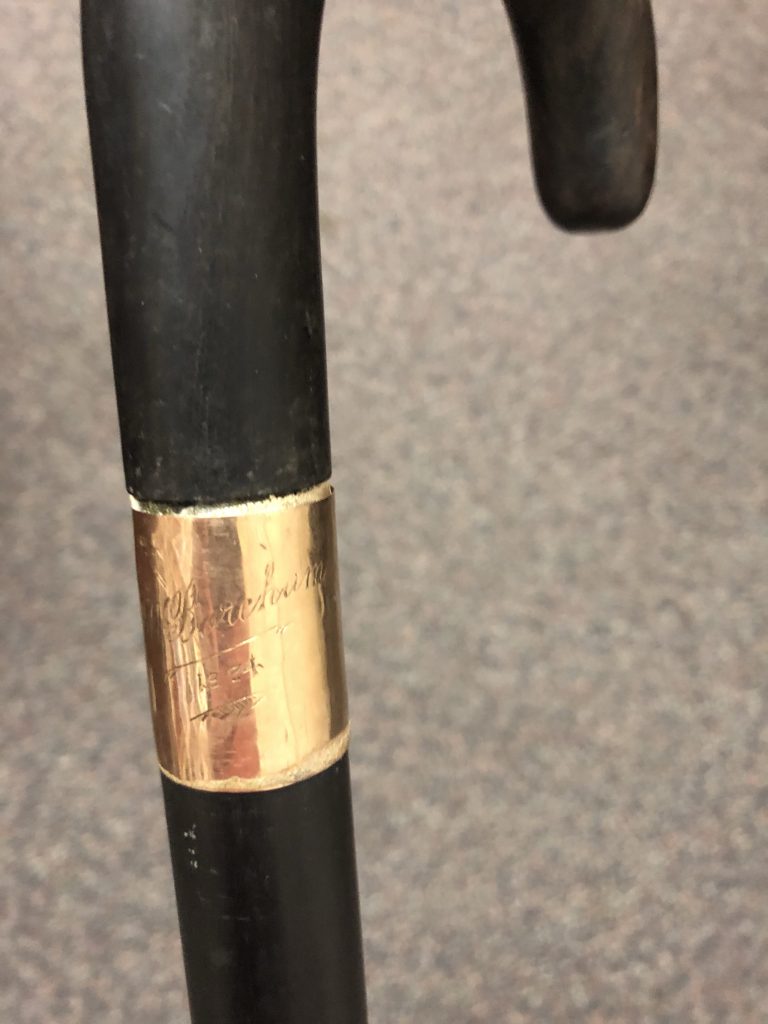
F.W. Boreham’s walking stick, gifted to him in 1924
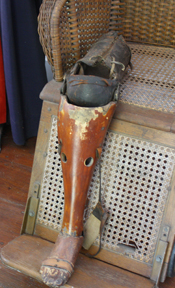 At the age of 15, Frank was involved in a horrific accident with a train while working as a clerk at a local brick works which resulted in the loss of the lower portion of his right leg. This injury gave him grief for the rest of his life. He wore a prosthetic limb which, somehow, he was able to keep a secret from most people, for most of his life – even his grandchildren. He was already a very shy and private person, but this disability must have compounded this – especially later in his life. It was due to physical condition that his 1936 tour of the UK and North America, when he was now in his 60s, would be his last. This reluctance to be too publicly visible may have also been a contributing factor to his limited fame as a preacher toward the end of his life.
At the age of 15, Frank was involved in a horrific accident with a train while working as a clerk at a local brick works which resulted in the loss of the lower portion of his right leg. This injury gave him grief for the rest of his life. He wore a prosthetic limb which, somehow, he was able to keep a secret from most people, for most of his life – even his grandchildren. He was already a very shy and private person, but this disability must have compounded this – especially later in his life. It was due to physical condition that his 1936 tour of the UK and North America, when he was now in his 60s, would be his last. This reluctance to be too publicly visible may have also been a contributing factor to his limited fame as a preacher toward the end of his life.
THEN WORLD WAR II HAPPENED
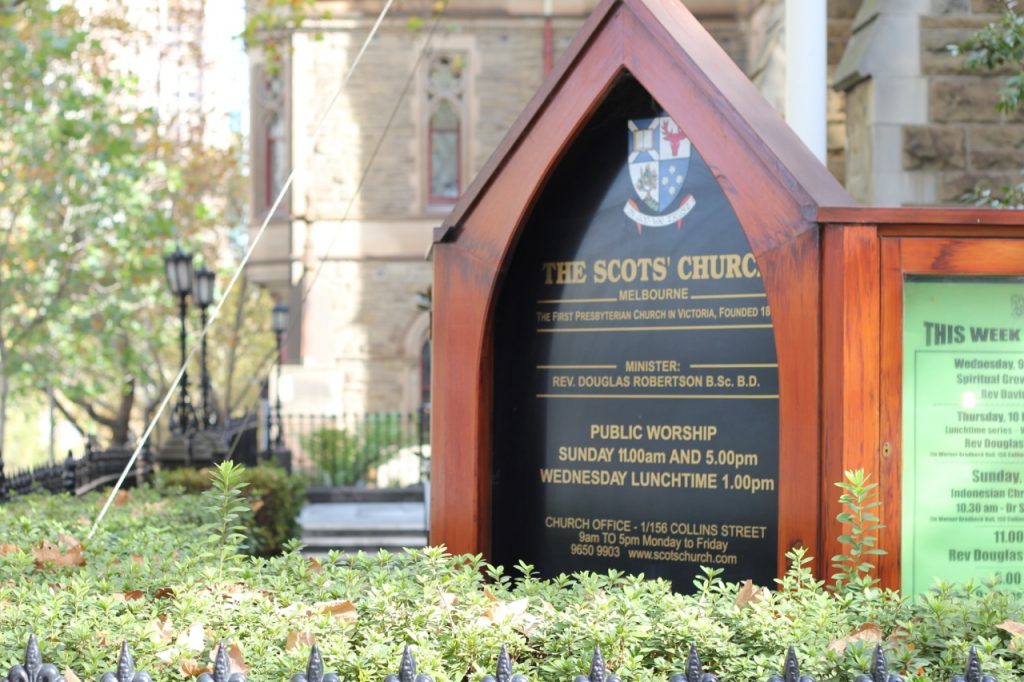 Boreham had suffered terribly during WWI when many of the young men he had encouraged into the military in ‘the defence of the Empire’ had been slaughtered at ANZAC Cove. When he took up the pastorate in Melbourne, he spoke no more of the war. When WWII broke out, he maintained his stance. This led to him being heavily criticised at this time. While other preachers gladly incorporated war themes into their sermons, FWB refused to do the same. By this time, from 1938, he was the Wednesday ‘lunch-time’ preacher in the prestigious Scots’ Church, Melbourne. The upheaval in Europe at that time had everyone apprehensive that another world war was imminent. In 1940, Boreham published, My Pilgrimage, in which he opens with a reminder of another time when Germanic forces were vanquished around the time of his birth in 1871.
Boreham had suffered terribly during WWI when many of the young men he had encouraged into the military in ‘the defence of the Empire’ had been slaughtered at ANZAC Cove. When he took up the pastorate in Melbourne, he spoke no more of the war. When WWII broke out, he maintained his stance. This led to him being heavily criticised at this time. While other preachers gladly incorporated war themes into their sermons, FWB refused to do the same. By this time, from 1938, he was the Wednesday ‘lunch-time’ preacher in the prestigious Scots’ Church, Melbourne. The upheaval in Europe at that time had everyone apprehensive that another world war was imminent. In 1940, Boreham published, My Pilgrimage, in which he opens with a reminder of another time when Germanic forces were vanquished around the time of his birth in 1871.
Salvoes of artillery and peals of bells echoed across Europe on the morning of my birth. Some men, situated as I was, would have taken it for granted that those thunderous reverberations and melodies carillons had specially organized in their honour. Incredible as it must seem, however, I was in those days so extremely modest that no such though occurred to me. I discovered afterwards – long afterwards- that my advent synchronised exactly with the dramatic termination of the France- Prussian War. on Friday, March 3rd, 1871, an hour before my arrival, the Prussian troops that held Paris in a cruel strangle-hold commenced the evacuation of the capital.
MY PILGRIMAGE, 1940, pg. 9
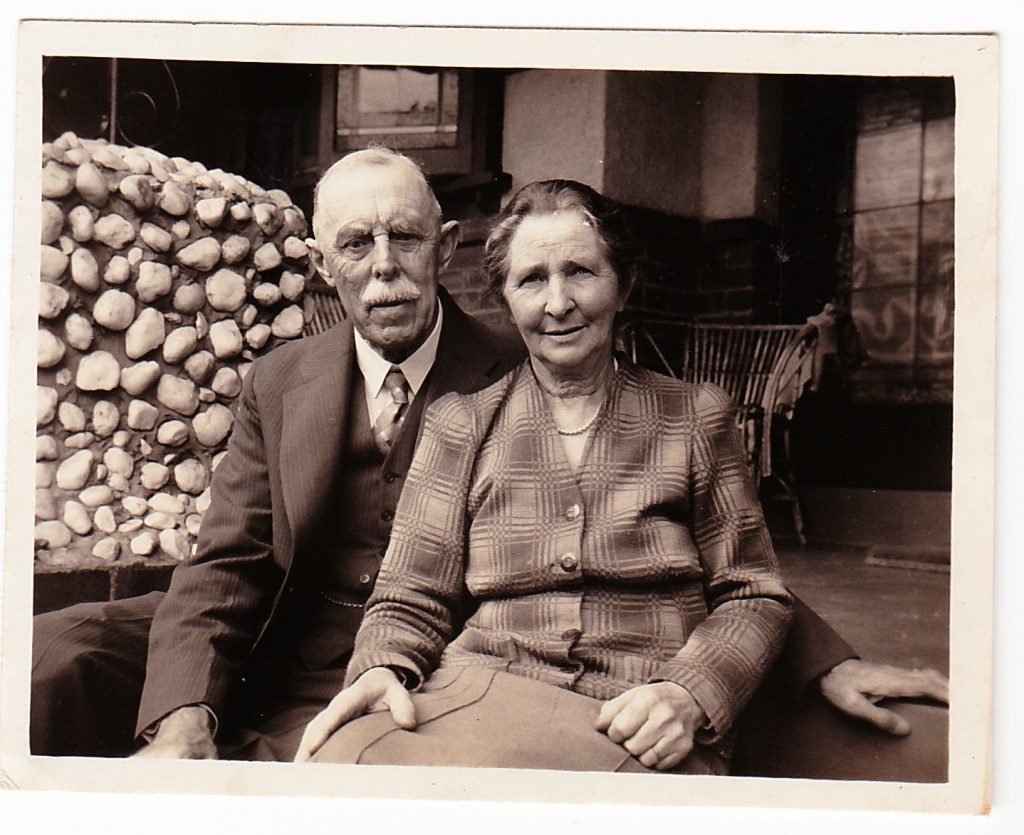
Dr. and Mrs Boreham, 1952
Boreham’s unwillingness to engage in such temporal things as wars caused many to consider him to be out of touch. As is often the case with the noisy critics of great minds, no one remembers their names while the world is now celebrating and being introduced to some of FWB’s greatest and most enduring work! But if we are looking for reasons why Dr. Boreham was not more widely known as a preacher, the events of and his response to World War are a factor.
THE PEN BEFORE THE PULPIT
Initially FWB saw his pen as his means for developing his preaching. Even to this day though, Boreham became more thought of as a writer than a preacher. The promotion of his writings was largely done by other preachers and church leaders who enjoyed and benefited from his books. By the 1950s though, this band of admirers had thinned. Throughout the next few decades people would occasionally stumble across an FWB book in a secondhand book store and rediscover the genius of Dr. Boreham. In recent times, one popular preacher frequently cited and referred to Boreham in his sermons. When asked at a large gathering how he managed to care for his own soul, without hesitation, he said, “F.W. Boreham!” He told how each morning, before reading his Bible, he would read one of F.W. Boreham’s essays and feel his soul refreshed. I suspect that FWB had an inkling that his writings would live long past him and have such an effect upon people. Even though he was criticised for writing in a very ‘romantic’ style, it is this style which makes his writing so enchanting today and gives it greater longevity.
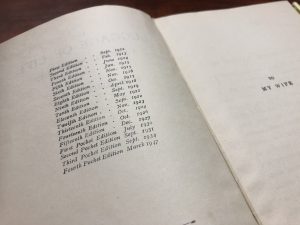
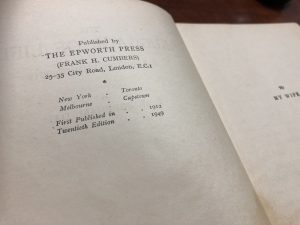 There would not be many authors in the genre in which F.W. Boreham wrote who could claim that of the 55 books they may have written, most of them would go into 12 or more reprints!
There would not be many authors in the genre in which F.W. Boreham wrote who could claim that of the 55 books they may have written, most of them would go into 12 or more reprints!
Why is FWB not more widely known today? As an admirer of Dr. Boreham and his ministry, it feels somewhat unjust that this is the case. But there are some of us who are trying to correct this injustice. Dr. Geoff Pound, along with Michael Dalton have been republishing some of FWB’s books, and compiling new editions for a new generation. Today several young preacher are discovering the works of FWB, and continually introducing people to his work. My documentary series on the life, work, and ministry of F.W. Boreham, Navigating Strange Seas, has been viewed by hundreds around the world. The F.W. Boreham Facebook now has over 2,000 likes. And perhaps you might join with us and introduce even more people to F.W. Boreham and ensure that after we’ve all gone, there’ll be another generation who might enjoy Dr. Boreham’s legacy as much as we all have.
-Andrew Corbett

















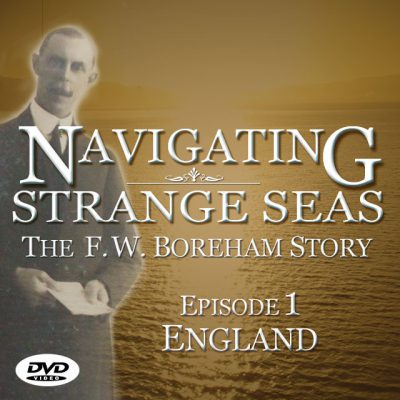
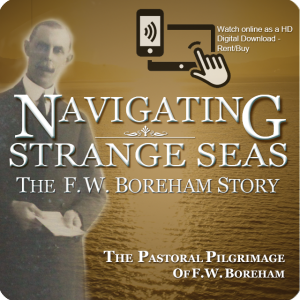
Love this! Thanks Andrew.
You’ve quickened my interest to learn more of FWB & to read his works! Thank you Andrew!
A clear and fascinating summary, thank you!